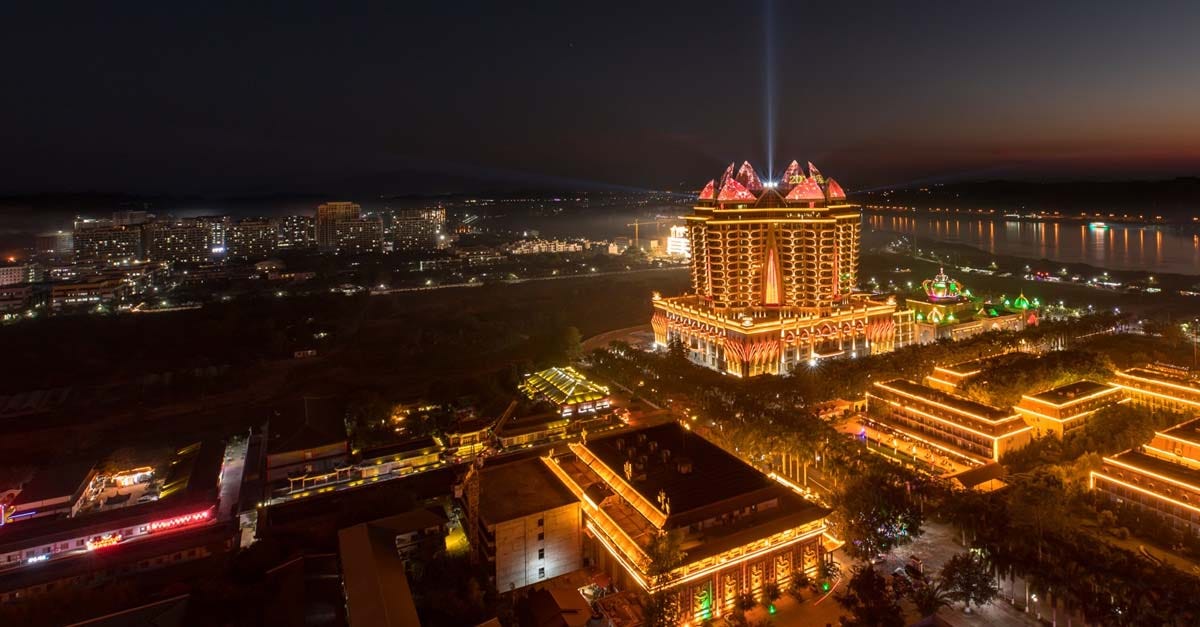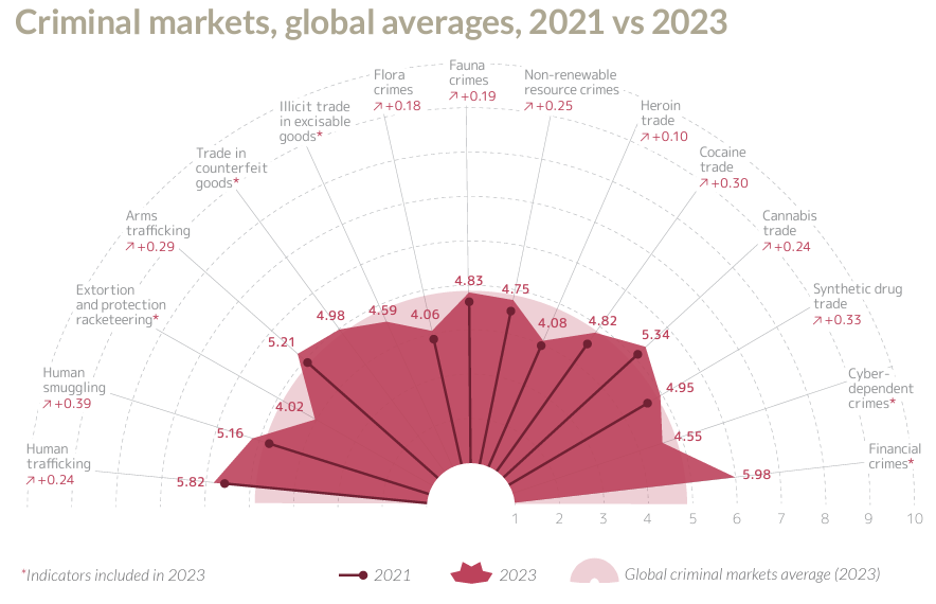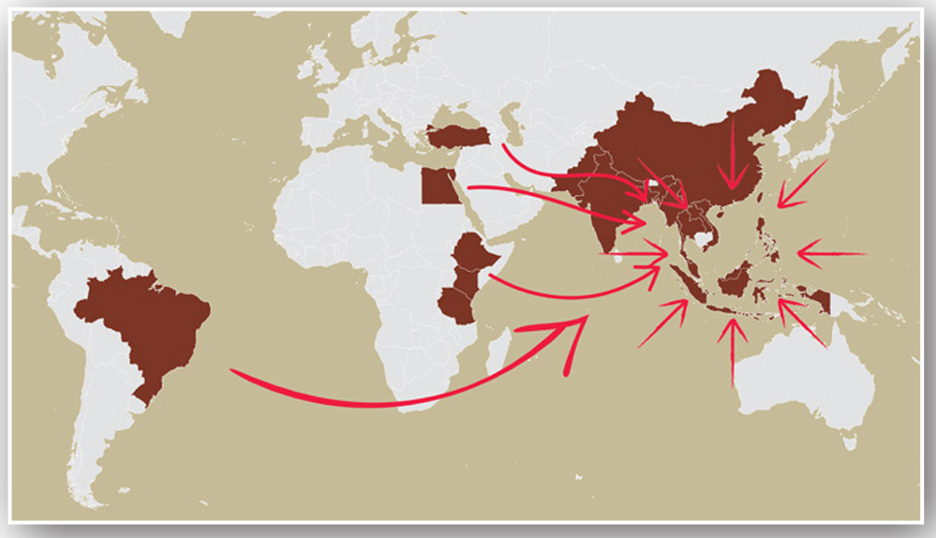Global Crime Rising as Groups Adapt Technologically
International criminal activity is spiking as criminal groups use increasingly sophisticated technologies from lawless corners of the globe.
The Kings Romans Casino is the centerpiece of the Golden Triangle Special Economic Zone (GTSE) in Laos, a lawless center of global criminal activity. Image source
Each year, organizations in Myanmar and elsewhere in Southeast Asia – primarily of Chinese origin – recruit thousands of mostly young people searching for legitimate jobs with decent salaries. Promised lavish accommodations – sometimes in far-flung and exotic destinations – these individuals are instead subjected to forced labor, torture, and sometimes death at the hands of increasingly powerful criminal groups. Although some have escaped to tell their stories, many more remain confined in horrific conditions, forced to scam people from around the globe.
Criminal activity is rising globally, as is its number of victims. According to the Global Organized Crime Index, the global criminality score increased from 4.87 to 5.03 (out of 10) between 2021 and 2023, and over 80% of the world’s population is now living under conditions of high criminality. Although this rise is due to multiple factors, it has been partly facilitated by the adoption of new technologies by criminal groups worldwide. In 2015/2016, organized crime comprised an estimated 7% of global GDP – or as much as $4.8 trillion. This figure is likely much higher today as organized crime groups access new technologies that allow them to seek out victims in every corner of the globe.
Organized crime, mapped globally. The darker the color, the higher the levels of organized crime. Image Source
This figure indicates growth in all categories of organized crime between 2021 and 2023. Image Source
Organized Crime and the Technology Fueling It
The internet plays a pivotal role in helping transnational criminal networks grow. The integration and use of internet- and cyber-based technologies increased dramatically during the COVID-19 pandemic among criminal groups as well as states and terrorist groups. Southeast Asian crime rings have scaled up their human trafficking operations significantly in recent years, taking their regional operations global and victimizing millions of people. These criminal networks trafficked over 100,000 people into online scam centers in Cambodia last year alone, turning these individuals into cyber-slaves. In Myanmar, over 120,000 people are reportedly held in compounds amid a surge in criminal activity following the country’s 2021 coup and subsequent insurgency.
Since COVID, criminal groups have adopted various communications technologies across multiple social media platforms to pivot their business models into this highly lucrative form of scamming and away from their traditional labor and sexual trafficking. To perpetrate scams, criminals lure in thousands of victims each year on the pretext of employment or other benefits, only to force them to carry out scams on other would-be victims. These trafficked victims, forced to run these scams, are often sold between different groups multiple times and frequently face violence, torture, organ harvesting, and death. Such scams include pig-butchering – where criminals bilk increased sums of money out of a victim before disappearing – which has incurred losses of as much as $75 billion worldwide. Other scams include romance-investment cons, illegal gambling, money laundering, crypto fraud, and more. Moreover, these groups increasingly target victims in the West due to Beijing’s recent pressure on Myanmar’s military government. Southeast Asia’s scam centers are now so successful that West African criminals now replicate this model at home.
Online scams target a widening pool of victims, from mainly blue-collar people to increasing numbers of highly educated, computer-literate individuals. Scammers use widely available social media and internet data to target victims more sophisticatedly. By adopting AI and blockchain, these scammers can impersonate legitimate businesses and institutions - especially recruitment agencies – while creating content that makes it harder for potential victims to determine what is and is not real.
“What began as a regional crime threat has become a global human trafficking crisis,” said Jürgen Stock, INTERPOL Secretary General, of the online scams in Southeast Asia.
Organized crime networks increasingly use drones for a variety of activities. In South Africa, criminal syndicates use drones to transport drugs into the country as well as for surveillance and distribution. In Mexico, highly militarized cartels use drones for a variety of purposes, including dropping bombs on enemy forces and intimidating civilians. In Southeast Asia’s Golden Triangle – a more than 350,000 square-kilometer region between Thailand, Myanmar, and Laos – criminals use drones to survey potential trafficking routes. Transnational drug networks also have maritime drones and narco-submarines at their disposal. Similar to cyber-technologies, drones are facilitating growth in drug trafficking, with authorities seizing new ‘record’ hauls of narcotics each year.
New technologies have facilitated a convergence of criminal markets in the Golden Triangle. Drug trafficking, human trafficking, weapons trafficking, pig-butchering, and more are increasingly linked as organized crime groups diversify their incomes and trade to become larger global players. Underpinning this explosion in crime is a growth in underground financing and banking methods. Criminals use casinos – which are highly prevalent in the Golden Triangle and parts of the Mekong River basin – to launder vast sums of illicit cash before injecting this money into the global financial system using cryptocurrency exchanges and other blockchain technologies. Here, criminal gangs set up operations where the rule of law is laxly enforced, such as the Golden Triangle Special Economic Zone (GTSEZ) in Laos.
The GTSEZ sits along a Laotian portion of the Mekong River across the border from Thailand and Myanmar. Much of the criminal activity there is reportedly under the de-facto control of Zhao Wei, a Chinese organized crime boss who owns and operates the zone’s centerpiece, the Kings Romans Casino. Despite being in southern Laos, the GTSEZ is an almost entirely Chinese enclave: Mandarin is the lingua franca, and all the clocks are set to Beijing time. Zhao is on a US Treasury sanctions list for wildlife, drug, human trafficking, money laundering, and bribery. This enclave and others like it give organized crime networks space from authorities and are becoming major global criminal centers.
’’Fundamentally, what we are seeing is the supercharging of illicit economies [through technology] within the Mekong subregion of Southeast Asia.” – Jeremy Douglas, Regional Representative, United Nations Office on Drugs and Crime
Movement of people trafficked to scam compounds in Southeast Asia Image Source
The challenge of tackling organized crime
In places such as the Golden Triangle, local, regional, and international authorities face numerous challenges when taking on criminal activity. These include a lack of funding that allows some criminal groups to maintain a technological advantage and a lack of inter-jurisdictional and transnational cooperation, legal barriers, and official corruption. These challenges are particularly acute in Myanmar, which has the highest score on the Global Organized Crime Index of 8.15 out of 10 and the third lowest resilience to crime out of 193 countries. Here, the state is a significant barrier to reform as state-embedded actors are the primary criminal actors in the country. As criminal groups continue to harness the technologies that connect us globally, lawless places such as this will likely only grow in importance to these criminal operations.
Conclusion
Like terrorists, organized crime groups are adopting new technologies ranging from cyberspace to sophisticated robotics to expand their global presence. In places with high levels of official corruption and law enforcement, such as the Golden Triangle, these technologies offer criminal groups the means to diversify their operations, increase profits, and participate in the legitimate global financial system. This problem is unlikely to remain unaddressed unless countries can reach new and comprehensive means of cooperation, which seems increasingly unlikely in our increasingly polarized world. With illicit activity and the costs associated with it rising each year, many more innocent people will likely fall victim to these groups moving forward.









Certainly an eye opener on the enclave in Laos and the connection between scams and trafficking. Very informative.
Very well written